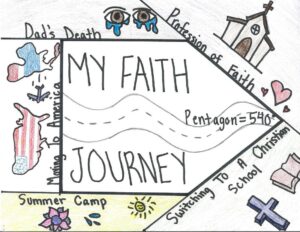
College English is seen as a difficult but necessary course for seniors to take at South Christian. Mrs. Wierenga, one of the College English teachers, challenges students to do more than write for college audiences; she encourages them to think about how their words matter. With a collection of branches arranged to spell out Mrs. Wierenga’s reminder to her students, “Words Matter” is framed on a classroom wall for all to see. The students are anxious and eager to learn how to write for the next step in their education. Mrs. Wierenga wants them to learn that writing well is only a step in the process of self-discovery: the words that students use reveal their fears, their faith, and their growth.
Mrs. Wierenga works on the growth of each student by helping them identify their writing goals, where they have room to improve, and how they can sharpen their writing techniques. Growth happens through challenging experiences, and this is true in College English as well. When assigning new essays, Mrs. Wierenga encourages students to choose topics that mean something to them personally because words matter to the writer, but then she also encourages students to think of people in their lives to whom these same words will matter. The students begin to think about the people in their lives and select topics that matter to those people. In doing so, the students reflect not only on the person who is important to them but also on the words that the student believes his or her audience needs to read. In the process of research and writing, students discover the value of the words they have. The topics selected range from “why the senior year is stressful” to “why loss is so painful”, and from a definition of “empathy” to an explanation of “heroism”. The audiences selected range as well.
One student decided to write to middle school teachers to offer a study on how bullying affects self-esteem. Since the student was bullied by peers in middle school, the student took the opportunity to cultivate painful memories to help teachers grow. The writing comes from a place of pain to offer healing; not only from past experiences but also for future students who experience bullying on the playground. With a specific audience in mind, the student is able to grow in understanding that all words matter.
As the students begin to wind down the nine weeks of the first semester, they reflect on their growth. They are able to recognize how their writing is authentic because they are given the opportunity to be authentic. Each student’s voice becomes clear in his or her writing because there is the value given to words and value given to audiences. By having words and audiences be intentional for the students, their authenticity is on display in their writing and in their classroom.
The students’ authenticity was on display when Mr. Meckes, who was having a particularly difficult day, stopped by the College English classroom to say, “Hello.” After the conversation, one student could tell that Mr. Meckes was having a challenging day and asked if the class could stop and offer a prayer on his behalf. The classroom fell silent, and another student prayed. The student’s words mattered as they prayed.
In a classroom where words matter, students have the opportunity to grow in their skills and expertise. What is most important is that they are able to practice and grow in using words that matter not only to themselves but to others as well. The students grow through their writing, their audiences, and their prayer.
—Ryan VandenHeuvel, English Teacher & TfT Lead





